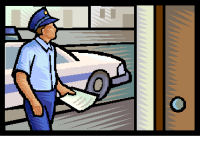 By Elena Pena
By Elena PenaOctober 26, 2011 (San Diego’s East County)--When we think about police officers, recent incidents such as shootings and high-speed pursuits come to mind. We might also think of their day-to-day duties such as patrolling, giving out tickets and responding to emergency calls. Rarely does the public actually take into account the high levels of stress and resulting health risks associated with being a police officer.
Aside from the risks involved in their every-day work schedules, they have to deal with an array of long-term health issues that impact them long after they hang up their badges. The high levels of stress induced by long working hours and day-to-day occupational risks takes its toll after years of being in the force. Cardiovascular disease seems to be a constant threat. Statistics show that police officers die ten years earlier than the general population. Their risk of a heart attack doubles with each decade and officers over the age of 40 have a higher 10-year risk of coronary heart disease compared to the national standards.
There have been many studies done by researchers in the past decades to suggest that the high levels of stress associated with this occupation can have highly negative effects on the lives of these brave men and women. Studies have shown that 40% of police officers are logging in over 12-hour work days. Their irregular work schedules can have a great impact on their bodies’ natural sleep cycle and lead to Circadian (natural sleep cycles) misalignment. Often officers work normal day-time hours and then an extra long shift that goes on until the morning hours or they work a full night shift.
Retired officer Richard Rouleau worked 28 years for the El Cajon Police Department, and says the longest shift he’s ever worked was also 36 hours. “The first time I worked Patrol, we worked an 8 hour day and rotated shifts every 3 months,” he states, “the rotation was hard, your body would get used to the hours then it was time to work a different shift.” Rouleau goes on to say that the second time working Patrol consisted of 12.5 hour shifts and after a long day of work it was difficult to come home, decompress and fall asleep.
Eric Thunberg, the temporary district commander for the Chula Vista police department says shifts tend to vary from day to day. The CVPD’s system is based on working four 10-hour days a week. One day might be a day shift from 6 a.m. to 4 p.m.and the next might be a swing shift from 2 p.m. - midnight, then there’s also the weekly graveyard shift from 10 p.m. – 7 a.m.
Another thing that’s not often taken into account is the fact that officers require time beforehand to get ready for their shift. Most get there an hour before their scheduled time to put on their uniform and gear and check out a patrol car. Then there’s the half hour to an hour timeframe at the end of the shift to complete paperwork. At the end of the day, the time spent on the job might actually add up to a 12-hour shift regardless of the scheduled 10-hour workday. The time spent working also depends on the kind of work you’re doing for the department. Thunberg once worked 36 hours straight doing detective work.
Researchers have found that no matter how much sleep someone gets during the day it never compensates for the sleep lost during the night. Our bodies are made to rest and recharge during the night hours. This leads to an excess in fatigue and eventually to sleeping disorders such as insomnia.
Poor sleep quality impacts police officers twice as often as the general public, affecting decision-making, emotional control, and the ability to perform motor tasks. It affects the physical, mental, and emotional well-being of officers.
When asked whether he’s dealing with any issues related to stress caused by work, Thunberg states that personally he’s been very fortunate to not have these kinds of problems but he’s seen colleagues struggle with these issues from time to time. When confronted with the same question, Rouleau says there are certain health issues that are difficult to attribute to the job. While he was placed on medication for cholesterol this year, he can’t say for sure if it was work-related or a result of age. He did, however, file a claim for hearing loss after working 20 years as a firearm instructor for the department.
Daily work stress impacts not only the individual but the family as well. Divorce is a common result of this. Studies have also shown that officers who are divorced or are having relationship issues are often more susceptible to suicidal thoughts. Stress impacts their family relationships and in turn this affects their stress levels, forming a vicious never ending cycle.
Thunberg says it’s difficult not to bring the job back home with you. He did notice that after starting his work with the department his behavior changed. “When you’re at home you just want to sit back and disconnect from the world but you’re always on alert for any potential threat,” he says.
While these issues alone are serious, statistics show that 13% of suburban officers feel the effects of an even bigger problem, Post-Traumatic Stress Disorder (PTSD). This condition, while mainly associated with war veterans, also affects members of the police department, with urban police officers suffering from even higher rates than their suburban counterparts.
PTSD levels of officers is four to six times higher than the general public. Thunberg says he’s seen this problem first-hand with someone in his unit. One of his officers had to respond to a drowning child, a child suicide, and take part in a SWAT incident all within a four-week period. Being married and with young children of his own, the officer stopped sleeping at night and soon began developing symptoms of PTSD. Thunberg says there have been times when he’s responded to a situation dealing with children and it’s difficult not to see his own child’s face on theirs.
Day to day traumatic events are hard to let go of and continue to haunt you even after you leave the force. “If you talk to any officer, they will tell you about the never ending dreams. This has continued into the eighth month of my retirement,” Rouleau says about the images that are still fresh on his mind from his time working with the ECPD.
So what are local police departments doing to fix this problem and how are they helping officers deal with the stress? Luckily the departments provide services to help them deal with these issues. “
Our organization offered a psychiatrist who taught us how to alter our behavior,” states Thunberg. It was important for them to learn how to deal with situations differently on the job and at home. Aside from having professionals come and speak with them, the department also offers debriefing with counselors. “We can talk about anything we want and they are available any time we need them,” he continues, stating that The Employee Assistance Program also provides them with help when dealing with issues such as marital problems and anger management.
As a retired officer, Rouleau is also able to attend counseling, if needed. “The city [of El Cajon] has a contract with an outside company, I believe you get eight visits per problem,” he states. When it comes to health insurance, Rouleau says the city provides $600 toward medical to officers who are still with the department. Having a family to take care of brought his expenses up to well over $1,300 a month. Now in retirement, he pays $1,400 a month for medical, with the city only providing a measly $50 a month.
After spending years protecting and serving the community, officers believe they deserve more help to cover healthcare costs and decent retirement plan to make sure they’re taken care of after leaving the department. “One thing that’s definitely not taken into account is the cost of health care and the fact that we don’t pay into SSI,” says Rouleau.
Rouleau says the one thing that still bothers him is that the public sometimes doesn’t see police officers in the best light. Some blame officers instead of taking responsibility for their own actions. They don’t see the truth about the dangers of the job and the sacrifices officers make every day.
The saying ‘don’t judge a book by its cover’ couldn’t be more fitting. An officer might seem moody or unfriendly but the public has no idea what situations that officer might have seen or dealt with in the past 24 hours while serving the community.
“The best thing the public can do is be understanding,” says Thunberg. He wants people to realize that officers are people with feelings and fears, just like everybody else. They have a demanding job that requires them to witness traumatic events. Most importantly, as Thunberg states, “Officers are good men and women and as such, sometimes mistakes are made but for the most part they do things with good intentions.”








Recent comments